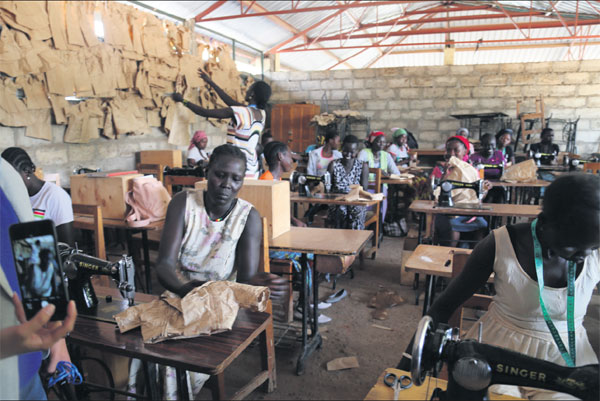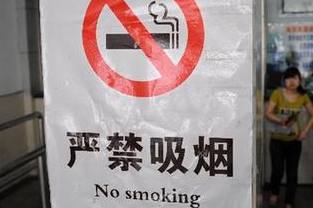Aid groups urge stepped-up efforts in Kenya

Limited funding for refugees poses challenge as needs increase for food, shelter and services
As the number of refugees in Kenya continues to increase due to the ongoing instability in South Sudan and Somalia, humanitarian agencies have called upon the Chinese government, among other donor communities, to step up support for the desperate refugees.
Provision of life-saving assistance to refugees by humanitarian organizations is increasingly difficult due to limited funding, says Honorine Sommet-Lange, the head of Sub-Office Kakuma for the United Nations High Commissioner for Refugees.
| A tailoring and dressmaking class at Don Bosco Technical institute. Edith Mutethya / China Daily |
"We depend on the donor communities in order to be able to provide food, shelter, sanitation, education and healthcare services to refugees," she says.
Kenya is hosting about 490,650 refugees and asylum seekers, with the majority fleeing conflict in South Sudan and Somalia. Eighty-six percent of the refugees live in camps with restricted movement and are not allowed to work for pay outside the camps. Therefore, they depend solely on humanitarian agencies for survival. The remaining 14 percent live in urban areas.
The Daadab refugee complex has 246,517 refugees, according to the UNHCR, while Kakuma refugee camp has 176, 872. Nairobi, on the other hand, has 67,267 refugees.
Sommet-Lange says inadequate water supplies and lack of schools are their biggest challenges. She calls upon China to help drill more boreholes in the Kakuma refugee camp to solve the water shortage.
"China has sophisticated machines that can assist in drilling more boreholes in this area. The country should also help us acquire solar panels, which can provide a cheaper power to pump and treat the water. There is no power grid at the Kakuma refugee camp, hence we use diesel, which is quite expensive," she says.
She also appeals to donor communities to help the agencies build dams so the refugees may be encouraged to engage in agriculture.
Fred Magumba, the Kakuma area manager for the Norwegian Refugee Council, whose tasks include developing water infrastructure, treating water, building latrines, managing water and running hygiene awareness campaigns, says there are many challenges to providing water to the camp.
"It has been expensive to pump water because we use fuel-powered systems," he says. "However, we are introducing solar-powered systems in order to cut down on operational costs."
Due to low groundwater tables and the need for large quantities of portable water, pumping is linked to high fuel consumption, which creates high operational costs for water supplies, according to the UNHCR.
Depending on the bore hole conditions, one liter of fuel can be used to pump 3 to 5 cubic meters of portable water on average. To reduce these costs, the Norwegian Refugee Council is converting fuel-powered bore hole systems to a hybrid system by adding photovoltaic panels.
"Out of the available 15 boreholes, eight have been converted to hybrid systems," Magumba says. "Our vision is that every new borehole we drill will be hybrid. However, we lack funds to actualize that, so we appeal for support from donors like China."
In addition to an inadequate water supply, the Kakuma refugee camp finds it difficult to accommodate all the students. The camp hosts 23 primary schools, five secondary schools and two vocational training centers.
Medical support is provided through a single hospital, and five satellite medical clinics respond to emergencies.
Nicodemus Ombworo, the head of the Don Bosco Technical Institute at the camp, says a shortage of learning materials means a limited number of students can be enrolled, despite the high interest from both the host community and the refugees.
Recently, 800 students turned up for computer training interviews, but only 487 could be enrolled, he says.
Annalisa Conte, representative and country director for the United Nations World Food Programme, says any intervention taken by humanitarian organizations must serve both the refugees and the host community in order to foster integration.
"If we only lean on the refugees in provision of services like water, healthcare and education services, we may create an imbalance that can cause more problems. This increases the amount of the required funding," she says.
edithmutethya@chinadaily.com.cn
(China Daily Africa Weekly 06/16/2017 page28)
Today's Top News
- The farmer, the snake and Japan's memory hole
- Crossing a milestone in the journey called Sinology
- China-Russia media forum held in Beijing
- Where mobility will drive China and the West
- HK community strongly supports Lai's conviction
- Japan paying high price for PM's rhetoric































